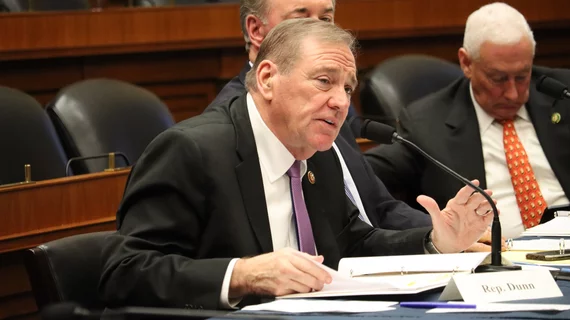House committee advances key legislation to strengthen pay for diagnostic imaging agents
Members of the U.S. House recently advanced key legislation aimed at strengthening pay for diagnostic imaging agents.
The Energy and Commerce Subcommittee on Health held a hearing May 16 to discuss the markup of 23 different legislative proposals. Those included the Facilitating Innovative Nuclear Diagnostics (FIND) Act, which would require separate payment for radiopharmaceuticals that have an average per-day cost exceeding $500.
House Resolution 1199 is supported by several industry stakeholder groups including the American College of Radiology and the Society of Nuclear Medicine & Molecular Imaging. The American Society of Nuclear Cardiology highlighted the subcommittee’s decision in a Monday news update. The bill now has 41 cosponsors and will head to the full House for consideration, ASNC reported.
“It is important to note that [the Centers for Medicare & Medicaid Services] has the authority to change the current packaging policy without passage of the FIND Act,” the society said May 20. “However, the House's consideration of the bill could put pressure on CMS to act.”
Currently, Medicare only reimburses for radiopharmaceuticals through a packaged system. But this can create a barrier for those who need newer nuclear imaging agents, advocates note. The FIND Act would eliminate this obstacle by requiring CMS to issue separate payment for such agents under the Hospital Outpatient Prospective Payment System, rather than bundling them with the procedure. Bipartisan members of the U.S. House and Senate introduced companion bills in early 2023 to address this longstanding issue.
During the recent hearing, sponsor and surgeon Rep. Neal Dunn, MD, R-Fla., said he is “thrilled” the bill has passed through subcommittee.
“When we avoid unnecessary and inappropriate treatment due to inaccurate scans, Medicare saves money. More importantly, when a physician can obtain an accurate diagnosis, we can achieve the best outcome for patients,” Dunn said in a statement issued May 17. “Throughout my career in medicine, I have seen how delayed or inaccurate screening can affect patients and their families. The FIND Act will increase access to life-saving scans while empowering doctors and patients with the ability to determine the correct diagnosis early.”
Others previously voicing support for the FIND Act include the American Society of Radiologic Technologists, the American Society of Neuroradiology, Bracco Diagnostics, GE HealthCare, the Mayo Clinic Department of Radiology, Siemens Healthineers, the Michael J. Fox Foundation and Eli Lilly & Co.

